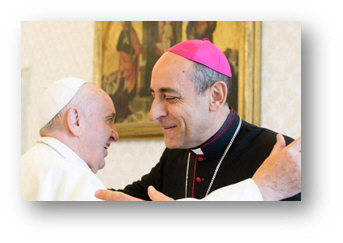|
The Queer and Impulsive God of
This “declaration on Catholic doctrine,” which is more properly an aberration from it — is Francis’s latest effort to appease a coterie of his most ardent supporters by attempting to legitimize “irregular” — which is to say, “sinful”— “unions” of actively-engaged homosexuals by invoking “blessings” upon them. It is effectively summarized in paragraph (31)
There are two very serious problems with this statement. Once concerns the manipulation of language, and one concerns a calculated misrepresentation of the notion of Actual Grace. Both are intended to mislead the casual reader, and to promote an agendum (specifically, homosexuality as acceptable to God and the Catholic Church — other supposed “irregular unions” implied are simply intentional distractions) that is not simply contrary to Catholic Teaching, but is militantly hostile to it. Let us look at the first:
“These [so-called
“pastoral”] forms of blessing express a supplication that God
may grant those aids that come from the impulses of his Spirit
…” This is a very queer notion. First, God does not have “impulses.” Consider the definition of “impulse” from four respectable sources:
What God is NotItalicized above are all the words in each definition that do not, and cannot, possibly pertain to God.
All these things pertain to the notion
of “impulses.”
No Blessings Can Come from What is Not GodThere are no blessings, then, that can possibly come from the fiction called “the impulses of his (sic, presumably God’s) Spirit,” for God the Holy Spirit, as we have gone to pains to demonstrate, does not have, and cannot have, “impulses.” Furthermore, to conflate this illegitimate and meaningless notion of God behaving “impulsively” with the legitimate theological concept of Actual Grace is nothing less than an attempt at theological legerdemain (trickery). In a word, the connection between the two is spurious. Perhaps the most succinct description of Actual Grace is along these lines: It is the grace given to the achievement of, and not enduring beyond, a salutary action that itself, as inherently good (for God will not and cannot give us grace to do something evil), and which is granted through the merits of Jesus Christ. More to the point, it is an irreconcilable contradiction to claim that people living in objectively sinful relationships — or the sins that Francis, Fernández & Friends prefer to verbally sanitize as “irregular unions” — are, in fact, capable of receiving an actual blessing that will assist them in achieving an action that is neither spiritually nor naturally salutary or good, for the action (active homosexuality) is intrinsically sinful, and as sinful, eo ipso evil.
Few appear willing to state this
inescapable conclusion for fear of being “socially incorrect” or “hurting
the feelings of others.” However, “hurting the feelings” of others so
that their immortal souls may avoid Hell and attain to Heaven is an
inestimably good act. It is an act of love, for love ever wills the
good of the other and no evil. Not on MeritSince Francis is keen to discourage piety in Catholics (dismissing reverence toward the Holy Eucharist as an attitude of regarding it as “a prize for the perfect” 5 — as though any Catholic deems himself perfect), or filial adherence to long established Church teaching as “rigidity,” “backwardness,” and more 6, we must hasten to add that the objection to a “blessing” of the sort proposed is not based on a matter of “merit,” since no one — absolutely no one — “merits” the grace of God in any form, Sanctifying, Habitual, or Actual. Francis cannot implicitly argue (as he did, concerning the Eucharist) that heterosexual couples (“proudly”) deem themselves meritorious of blessings (and are therefore unworthy of them), while (“humble”) homosexual “couples” recognize they are not worthy of them (and are therefore worthy of them). Why? We had just stated it: No one is deserving or worthy of them. But for this reason, are we to understand that the notion of sin no longer applies to human actions? For this reason is murder, or adultery, or active homosexuality not a sin? How did we even arrive at the semblance such ridiculous argumentum ad absudum? It is simple: the proposition — Fiducia supplicans — itself is absurd: that God can and will bless what is sinful and abhorrent to Him.
Editor Feast of St. Thomas Becket
Comments? Write us: editor@boston-catholic-journal.com See: Francis Digs in on Fiducia Supplicans: Refusing to Call a Spade _______________________ 1
https://www.merriam-webster.com/dictionary/impulse
|






















